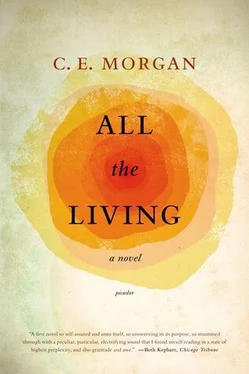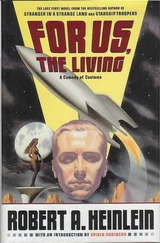He waited until she was done and said, What’s that you played just now?
A Mozart sonata, she said.
He walked up to the piano and looked down at the keys. He leaned down and pressed one and the pitch sounded, substantial and unadorned, on the air. I never learned to play, he said. I ought to have.
Oh, she said, did you want to?
We got a piano, he said, straightening up again. We still got it, though it can’t a been tuned for twenty years, I reckon. It’s beautiful, a special old piano. My grandfather bought it and there wasn’t nothing like it around here. He bought it for my grandmother Lily. He shook his head. Nobody had pianos back then. Just devil’s fiddles, he said and smiled, glancing at her, then back down at the piano again. It’s carved too. I don’t know who did that, but the legs are carved — and it’s done good too, somebody who knew what they were doing. The top is carved too.
The top, she wondered.
Yes.
It sounds kind of unusual. I bet it’s pretty, she said.
And when she said that, Bell said, Would you like to see it? and she made a play at hesitating for a moment and then with her face turned up so that the light of the window shone on her and deepened her eyes, she said, Yes.
He drove her out in the old car with the fancy fins, the one she had seen when she first came to the church asking for a job. His land was small, or at least the planted part of the land was no more than a few acres, just a plot of tobacco he pulled and sold at auction.
If I didn’t preach that church, he said, I’d farm the whole place, all the way down to the house like they used to. That’s how they used to do it. But when Daddy started to reverend that church, it got to be too much. We let a whole bunch go fallow.
But they don’t even pay you, she said.
Nah, can’t take no pay to preach. That ain’t right. And I lose money here to do it too, but we get by fine. Daddy always did it that way, I do the same.
The house where he lived with his mother stood much closer to the ridge than her house so that it reminded her of the school, the way it had nested in morning shadows. It made her a little earthsick to look on it. The tobacco rowed out before it on long raised beds and the fallow fields whiskered with tall grasses that shook and tangled with the wind that rose off the road.
I can’t figure why they built so close to the wall, he said. That ain’t safe at all. I got a second cousin in Grundy whose wife got killed when a boulder come down off the mountain and crashed right through the living room right in front of them. He shook his head. I always figured if I got rich — God forbid it — I’d rebuild out in that field — he pointed to a fallow field — that way we’d get more easterly light. That would be good for Mother. Morning light is good for the soul. I believe that.
Mrs. Johnson was in the house when they went in. She opened the door for them when they had barely stepped up onto the porch, as if she’d been hovering behind the door with her arthritic hand on the knob.
Hello, Mrs. Johnson, said Aloma and the woman nodded and smiled the smallest smile ever mustered by a human face.
I brought Aloma to see the piano, Bell said and Aloma wondered if his mother also caught the way he no longer called her miss, and from the long sideways look she cast him, it appeared she had. It’s over here, he said. Aloma followed him into a living room so full of furniture and bric-a-brac that Aloma’s eyes did not know where to rest. Photographs and newspaper clippings in frames covered the walls, plates and whittlings of tiny animals arranged in crowds on every shelf, pillows and blankets piled on every soft surface. All neat, all orderly, but no end to the heaped and hoarded possessions. The piano was the only unadorned object in the room. She stepped to it and stared at the complexion of its wood, blackish and vein-crackled with age, with carvings winding up the legs and across its top. She had expected it to be rough-hewn like the little whittlings all over the room — done by what appeared to be a young hand — but these were smooth and each line traced a sinuous curve. She ran her hand across the top. Bell lifted the cover then and showed her the keys, which had yellowed so that the grain ringed darkly on the surface. She pressed four keys in arpeggiation and the sound bloated out, the pitches sagging and unclean. She stood for a moment with her lips puckered out in disappointment, one eyebrow peevishly risen. She did not look up.
Been a long time since it was tuned, Bell said and laughed a laugh that threatened her temper suddenly.
Why not?
Ain’t a body to play it, said his mother, who until that moment had been standing in the doorway, watching silently, her hands curled at her sides.
I got a photograph upstairs of my grandfather with this thing. Hold up a minute, Bell said and he turned the corner past his mother and his feet sounded up the staircase.
His mother did not move, but she said, Was you at the church?
Yes, said Aloma and looked down at the piano again coolly. I was practicing piano.
Ever day, the woman said. It was not a question, but Aloma said, Yes, as though it was. She suddenly became sensible of the multiple clocks ticking in the room. Then the woman said, Where at do your people hail from?
From Cady Station.
I can’t hear that in your talk.
Is that right, said Aloma and looked at her with a pointed expression that the woman could not miss. Then, as though the old woman were not in the room, she turned her back on her to look at the pictures on the nearest wall.
How come you to be here? said the woman to her back, but then Bell’s feet returned again to the stairs and he was in the room with a framed photograph in his hand of a very thin and tall man dressed in black standing beside the piano, which bore the high sheen of youth then. Aloma felt another sudden flash of irritation as she took the photo out of his hands — at his cankerous mother, at Bell for bringing her here, at herself for coming, and most of all at this wracked piano, a perfect beauty rotted in its shell. She could not understand why everyone let the best things pass into disrepair and she would have thought Bell a better man than that, a man who could care especially for something — a piano, an old house, a woman. She looked up at him. It’s getting late, she said, handing the photo back, and she prayed silently that his mother would say nothing further, which she did not, she only stared and chewed at her lip and stood aside as they left the house.
The bright outside did little to relieve her. She followed Bell as he folded his frame into the old car and cranked the engine. They passed a mud-spattered late-model truck where it stood parked like a mechanical afterthought in the middle of the mudded front lane, which was patchworked with tire tracks running the length of the tobacco field. In the rearview mirror, she watched the small house recede with its hanging baskets, the small dark figure of his mother, the ridge wall beyond. In the dayward tilt of the woman’s body thrusting her pinched face into the space before her, Aloma was reminded of Bell, the way he stood on the edge of the front pews as he preached as if he were standing on the prow of a boat looking out. She glanced at him to consider the resemblance.
It’s funny how you look like your mother, she said.
Funny how?
Well, not funny… interesting.
He shot her a quizzical look.
I just think it’s interesting when people look like other people. I don’t think there’s a person in the whole world that looks like me.
Oh, he said. I see. Then, after a moment’s silence, I’m sure your mother looked like you.
She shrugged.
I’m sure she was pretty like you.
Читать дальше
Конец ознакомительного отрывка
Купить книгу











